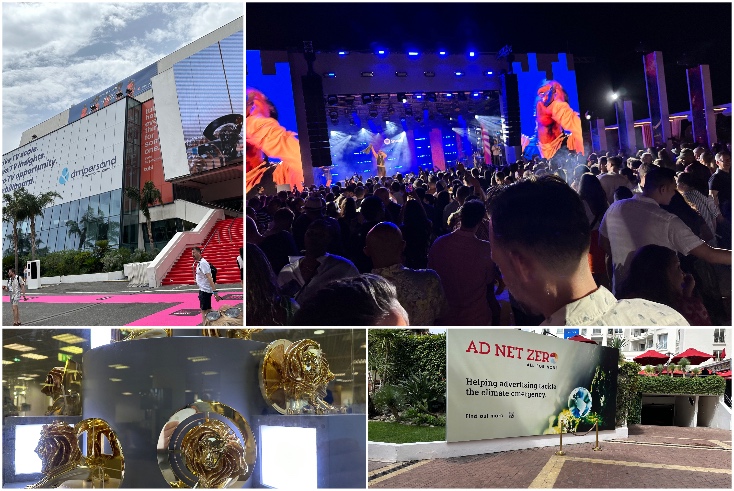For all the Cannes bravado, we need more bravery

Opinion: 100% Media 0% Nonsense
Cannes Lions remains an essential tentpole in the ad industry calendar. But it can’t cover up the many cracks that need fixing.
A confession: I love going to Cannes Lions. I love being in south of France. I love so many people in the industry being in one place together, I love the environment of celebrating creativity and, yes, the parties are pretty good, too.
Executives at Ascential, the company behind Cannes Lions, should feel confident that Cannes is “back” after the pandemic downer and their product is robust for a good few years yet. Despite what we heard a decade ago, TV advertising is far from dead, nor are other traditional channels such as radio, out-of-home or even publishing. I wasn’t at Cannes last year, but the vast majority of people I spoke to who were said it felt like Cannes was “back to normal”, after many people either decided not to go in 2022 or only went ‘last-minute’ for a couple of days.
And, if you were to judge the health of the ad industry from the sight of the marina (even more dominated by adtech companies than previous years), or the company logos on the beach (the same old media and tech companies as previous years, apart from the notable absence of the Twitter beach), it would seem that media companies have never had it so good.
But that’s where the rose-tinted outlook ends. By the end of my week at Cannes, I was quite surprised by how negative in outlook people were about advertising as a media proposition. Granted, my interviews and private meetings were mostly with people from the US with whom I don’t meet so often, but this felt like more than an American preoccupation: I was at an ad industry creativity festival that did not want to celebrate the business of advertising.
Let me explain.
U-shaped 2023?
Execs at the big digital platforms were quite clear that, compared to previous years, they don’t want to be in the business of advertising as much. Jon Steinberg, the new(ish) CEO of Future, was candid about the publisher being more dependent on “steady” revenue streams compared to an increasingly online ad market which is more easily buffeted by global economic forces or swings in short-term market confidence.
Meanwhile, bosses at two global ‘platforms’ (one based in the London, the other in New York), talked about the need to create tech partner solutions that form more trusted relationships beyond their ad platform. One of them is talking to retailers about providing a white-label version of its platform’s ‘try-on’ software for a brand’s website or app.
This comes against a rather negative financial outlook. One US media agency leader claimed to be “bummed out” by all the negative noises she has heard about Q2; while a well-known UK counterpart reckoned we are in for a ‘U-shaped 2023’ — that is, a decent January/February, terrible middle part of the year, but a return to form in the run-up to Christmas.
A bomb with no bang
The week began with a bombshell: Open Web advertising is potentially hugely wasteful of advertisers’ money and exceptionally bad at accounting for where the money goes. Yes, we were given an idea of this three years ago with a similar UK study by ISBA and PwC, but last week’s “first-look” findings by the US Association of National Advertisers at Cannes should have set the agenda.
Why hasn’t more been done to make online advertising more transparent and accountable? Why aren’t advertisers demanding more from platforms and media agencies? Why, more than a year after the invasion of Ukraine, is more not being done to stop this when we know so much of ad scams originate in Russia?
Instead, there is collective silence or, when pressed, a shrug of the shoulders. “What CMO wants to admit to their CFO that they’ve been wasting their money for the last decade?” one US-based media owner boss remarked.
This simply isn’t good enough. As Nick Manning wrote last week in response to the ANA report: “Advertisers should know as much about Programmatic as their agencies and adtech partners do. This isn’t that hard and there are plenty of independent experts out there to provide the expertise.”
Instead, I was hard pressed to find anyone who could raise an eyebrow about the ANA’s report. That’s not indicative of an industry high on confidence — it’s what you expect when people feel defeated or, perhaps worse, unengaged. For starters, why aren’t we creating awards for people and companies that can come up with solutions for solving this huge issue?
I’ve written before about this industry’s incredibly nonchalant attitude to ad fraud, which has been well known about for years and very little is done collectively to tackle it. If you value your product market so lowly that you say nothing when huge amounts of money leak away via incompetence or injustice, then you can’t cry too loudly when brands question why they’re paying you all this money for questionable return.
AI’s impact on the ‘entry-level’
It almost became a running joke throughout the week to ask everyone you met at Cannes “what they thought about AI”, given that artificial intelligence dominated the agenda at the talks around the Palais (if not in the awards exhibition centre itself). As Brandtech Group founder David Jones told me during an interview, AI will impact advertising in a bigger way than either the mobile phone or the Internet did.
I suspect that will end up being true, but it’s much less certain how AI will be most impactful in advertising and media in the long-term. A lot of what I heard discussed at Cannes was largely obvious: copywriting and audio/video production at scale are already being automated at scale and this trend will continue.
It’s not that AI is going to take your job in these fields; but the person who knows how to use AI in these fields almost certainly will. And yes, publishers will be hit with the double whammy of being under pressure to declare how much content is being created by bots while bad actors continue to clog up the Web with deepfakes and bilge.
But the penny dropped for me when thinking about our industry’s entry-level talent: what are they going to do if all the ‘grunt’ work is done by AI? Will ‘learning on the job’ be a thing anymore? Or are new entrants into advertising and media going to have to be more qualified to do the fewer jobs that remain?
Supercharged FOMO
One thing that robots can’t do very well, for the time being, is media sales. And, judging by the continued popularity of Cannes Lions, it’s obvious that personal relationships will continue to matter a great deal in the business of media.
“I can get more done at the Carlton at 2.30am than I can for a whole week back in New York,” a US agency group head told me. More broadly, you do get the feeling that what really fuels Cannes is a supercharged form of FOMO: it still feels like this is the place where the ‘action’ is happening. While deals are probably not being done in Cannes, the meeting before the meeting for the deal is, in all likelihood, still very prevalent.
I do wonder, however, if younger people entering this industry still appreciate that. One thing Cannes Lions does very well is engage younger people and students of advertising through the Young Lions awards scheme and other initiatives to widen inclusion for the next generation. It’s often said that Gen Z (or their even younger cohort Gen Alpha) are anti-advertising, but you also wonder whether they’re anti-advertising business.
I heard about one revealing talk about networking with students from Brixton Finishing School, hosted by a well-known video ad tech company. The student cohort, it seems, are not bothered about going into the office to widen and strengthen their professional network for reasons ranging from “I can do that myself on LinkedIn” or “I’m just here to learn skills to enable me to go freelance”, or “it’s not worth the time and expense of travelling in [from home]”.
You do wonder what is going on with our education systems to churn out such narrow thinking. We can blame social media and video games all we like, but Cannes was another reminder that there is a generational issue to be solved in this industry. Particularly if AI is going to eat away at entry-level jobs, this industry is about to get a lot older (and probably less diverse).
What happened to a one-page award entry?
I also, for the first time at Cannes, found time to survey the award-winning work in the basement of the Palais and attend a press conference about the Media Lions winners given by three of the jurors.
Well done to Dove and WPP agencies Ogilvy, David and Mindshare for the Grand Prix-winning #TurnYourBack, but I was left scratching my head over what exactly made it worthy of an award for, as the entry criteria says: “an inspiring and innovative implementation of media ideas; work which is enhanced and amplified by a game-changing channel strategy”.
This was a piece of social media/influencer activism to get women pictured “turning their back” on the camera to show their opposition to a beautification filter found on TikTok and other platforms. A worthwhile and timely campaign, to be sure, but I was left wondering what the actual media strategy behind it was to make it worthy of a global advertising award.
Then came a quite telling remark by Christian Juhl, the global CEO of GroupM and jury chair: “[Media agencies do not create great submissions. The [entries] that have the really great music, and the great fade ends and all the beautiful work… that’s all from the creative agencies. So we need to learn something from the creative agencies on how to submit awards.”
The rationale for this statement is that judges are busy, there are thousands of entries to look at for Cannes, and you need your work to stand out with some sizzle. That’s completely understandable, but aren’t you effectively shutting out independent media agencies who don’t have a sister ad agency lying around their massive global network to help you win an award? Instead, wouldn’t it be more inclusive, and more in the spirit of celebrating great media work, to demand that no films are submitted?
“Whatever happened to a good one-page written entry?” a UK media agency boss messaged to say upon reading my story about this last week.
Indeed, but then Cannes has never been about what’s appropriate for just one page. It always wants to fill a book — a big, bloated, beautiful book, whose content can sometimes be bullshitty, but, at other times, be bang on the money.
In the run-up to Cannes this year, I wanted to find out how much the festival still matters and how. The answer is, for all its faults, a resounding yes: Cannes still feels like a good barometer of where we’re at. It’s tentative, it’s lacking in confidence, but there’s certainly a lot of life left in it yet.
 Omar Oakes is editor of The Media Leader and leads the publication’s TV coverage. ‘100% Media 0% Nonsense’ is a weekly column about the state of media and advertising. Make sure you sign up to our daily newsletter to get this column in your inbox every Monday.
Omar Oakes is editor of The Media Leader and leads the publication’s TV coverage. ‘100% Media 0% Nonsense’ is a weekly column about the state of media and advertising. Make sure you sign up to our daily newsletter to get this column in your inbox every Monday.




